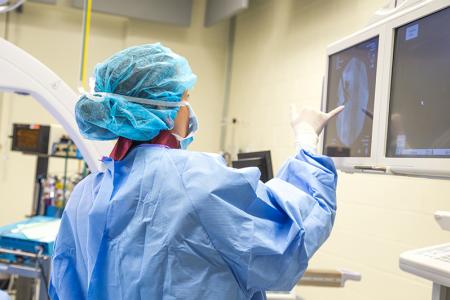
The UGA Veterinary Teaching Hospital recently launched its new Interventional Radiology (IR) service, and it is unlike any other in the region. Interventional radiology is an emerging field in veterinary medicine allowing for management and treatment of many diseases with minimally-invasive procedures.
The Veterinary Teaching Hospital’s IR service is well-equipped with advanced fluoroscopic imaging, high-definition endoscopy equipment, and both a diode and Holmium:YAG laser.
“Each laser type has its own advantages for certain procedures, so we can tailor treatment to each animal with the most appropriate laser type,” said Tracy Hill, DVM, PhD, DACVIM, MRCVS, DECVIM-CA. “We are also equipped with specialized fluoroscopy that has road mapping and digital subtraction features that, along with traditional fluoroscopy, allows us to better direct treatments.”
Dr. Hill is one of a hand-full of veterinarians in the world who has completed fellowship training in veterinary interventional radiology. She works with a team of veterinarians from multiple specialties within the Hospital.
“Our IR service includes a team of internists, soft-tissue surgeons, cardiologists, anesthesiologists and radiologists who each bring their own experience and expertise to the table,” said Joe Bartges, DVM, PhD, DACVIM, DACVN. “Our combined knowledge base and team approach allows us to provide the best patient and client care possible.”
 The team’s expertise and state-of-the-art equipment allows for the provision of an extensive range of minimally invasive procedures. Referral to the IR service is a perfect option for clients that are seeking the least invasive treatment option for management of traditionally surgical diseases, such as urinary bladder and urethral stones, ectopic ureters, and intrahepatic portosystemic shunts, among others. Additionally, the IR service can offer palliative treatment of diseases that were previously unmanageable, such as obstructive prostatic or urethral cancer or tracheal collapse.
The team’s expertise and state-of-the-art equipment allows for the provision of an extensive range of minimally invasive procedures. Referral to the IR service is a perfect option for clients that are seeking the least invasive treatment option for management of traditionally surgical diseases, such as urinary bladder and urethral stones, ectopic ureters, and intrahepatic portosystemic shunts, among others. Additionally, the IR service can offer palliative treatment of diseases that were previously unmanageable, such as obstructive prostatic or urethral cancer or tracheal collapse.
“Minimally-invasive procedures provided by the IR service have quicker recovery times and require less hospitalization,” Dr. Bartges said. “In some cases, the procedures are more effective and carry a lower mortality risk. In other situations, an IR procedure may be the only viable treatment option.”
Selected treatment options currently offered by the IR service include:
• Nonsurgical (laser) correction of ectopic ureters
• Laser lithotripsy of urinary bladder and urethral stones
• Urinary diversion procedures for managing patients with cancer of the urinary tract
• Non-surgical management of feline lower urinary tract obstruction (when a urinary catheter is not passable by traditional means)
• Alternative treatment for dogs with urinary incontinence not controlled with medical therapy
• Stent placement for collapsed trachea or nasopharyngeal stenosis
• Vascular procedures such as correction of liver blood vessel shunting and palliative treatment of vascular obstructions
For a complete list of available procedures, please visit vet.uga.edu/hospital/IR.
“Our team is excited about helping pets in a whole new way,” Hill said. “Veterinarians can be assured that any patients and clients that they refer to us will receive personalized attention and care in addition to benefiting from the advanced technology we will be offering.”
Veterinarians interested in learning more about this service can contact Drs. Hill or Bartges by calling 706.542.3221.
